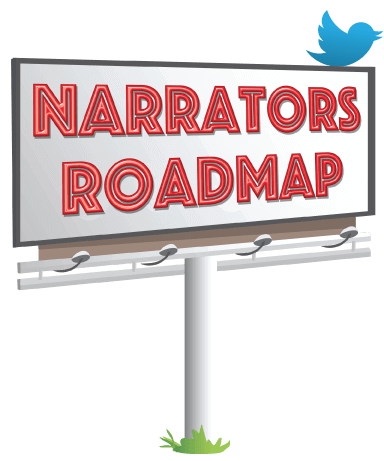Most audiobooks are performed by a single narrator. Co-narration occurs when 2 or more actors divide the performance of the text. These types of projects can be done 3 ways:
- Dual narration — 2 actors narrate everything in the chapters associated with their main characters’ points of view, including the lines from the other actor.
- Duet narration — 2 actors narrate their characters’ lines (and potentially those for all characters of the same gender) throughout the book. Normally, one person is the main narrator who would also voice the narrative portions. This approach requires extensive editing and therefore has a higher cost.
- Multicast / Full Cast — 3 or more actors perform the text. The producer would determine which approach above would be used and inform each actor of their roles. The producer may mark or color-code the parts or divide the text to aid the actors and editor. This style of narration requires significant coordination and editing and is the most costly type of audiobook to produce.
Dual and duet narrations are especially popular in romance books when the point of view (POV) switches between the main characters. Both narrators read and prep the entire book so that they can fulfill the author’s vision. It’s important for the actors’ studios to be of similar sound quality so that switching back and forth in the audio is not jarring to listeners.
In a co-narration project, actors can perform their roles:
- In the same studio at the same time. This option offers the highest quality recording and best collaboration, but it could require travel expenses and studio rental in addition to the narrators’ and editors’ fees.
- At the same time in separate studios but connected via Zoom or other real-time system so that they are responding to each other as they record their lines.
- Independently in their own studio. This option is easiest to schedule and budget, but the performances may not sound connected to each other.
Any time you’re an actor working with 1 or more narrators to create an audiobook, you need to collaborate and coordinate with your fellow actors so that you understand and utilize each others’ choices, especially with voices, accents, and pronunciations. The goal is creating a smooth and consistent listening experience, as if the customer was listening to the audio from a TV show or movie without any effects. You will want to follow the Co-Narration Standards developed by the Professional Audiobook Narrators Association.
Other resources on this topic:
- ACX does not have a way for a rights holder to hire 2 narrators. This article explains their payment options.
- In my article Dual Gender Narrations in Audiobooks, I explain how my husband Drew and I recorded — and I edited — a series of duet narrations. Actors working in different studios often use a dog clicker to signify where the other actor’s lines would be inserted in duet or multicast productions. However, the producer may choose another means for notating the insertion points. If the actors are working in separate studios, the editor must take care to match the sound.
- Narrator and Casting Director Tanya Eby wrote the article Best Practices for Co-Narration and offers suggestions for dealing with a non-responsive co-narrator in her article Three Questions and Answers on Audiobook Business. You may need a subscription to her Substack to read these pieces. She is offering a 50% discount to anyone coming from Narrators Roadmap. Follow this link to subscribe with the discount.








